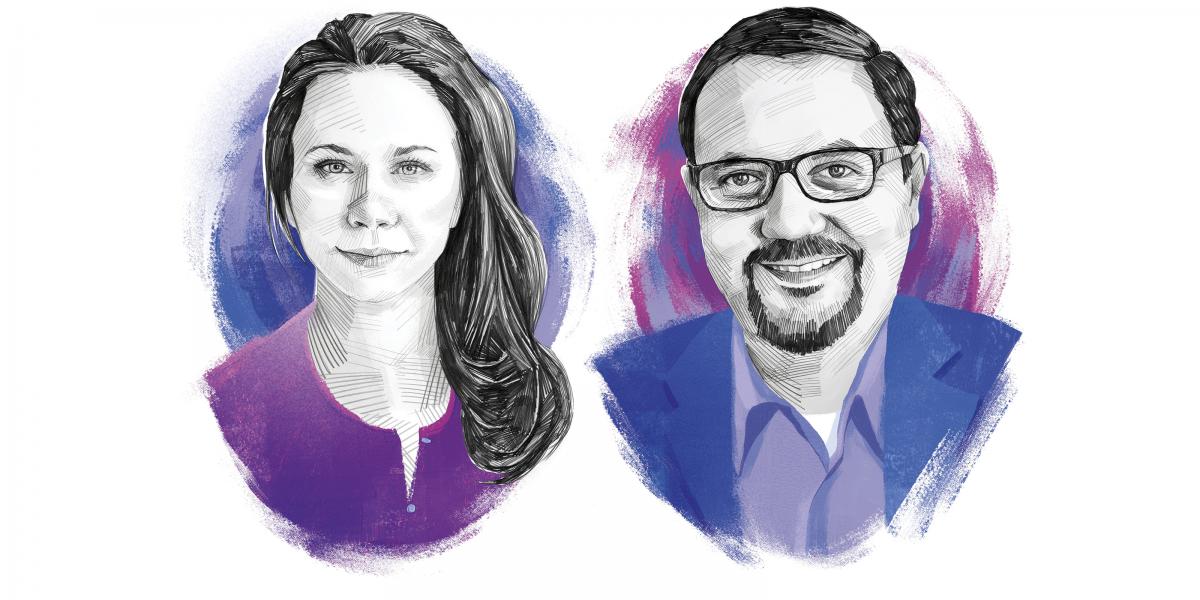The Exchange: Leading with Humility
Global Health Corps’ Barbara Bush and health systems expert Krishna Rao compare notes on mobilizing others to advance health.
Leading big changes in global health requires systems thinking, a desire to work outside of silos and across cultures—and humility, says Barbara Bush, co-founder of Global Health Corps. In a wide-ranging discussion, Bush compares notes with Krishna Rao, PhD ’04, MSc, a health systems expert and assistant professor in International Health. The pair touch on how to mobilize others, overcome pushback from the powers that be and lead change within oneself. Their discussion came at a signal moment for Bush as she stepped down in January as GHC’s CEO and transitioned into being the organization’s board chair.
KR: How do you identify people, Barbara? I’m in the business of teaching. I kind of have a way of finding out if someone is a good student or a good researcher. You’re in the business of identifying leaders. How do you do that?
BB: That’s a great question. We really look at it in two ways. One is the hard skills necessary to effect change. A lot of that is around systems thinking and systems skills. The other piece [is] leadership practices that are critical to effecting change: the desire to learn from others, the desire to work across cultures and do so in a way that is focused on collaboration and seeing value in all cultures.
For us, [it’s] humility, collaboration, and … seeing the responsibility to inspire and mobilize others. We need many voices at the table, but we also need many doers effecting change at the table. It’s not either/or. It must be both.
KR: What attracted me to your organization was your objective to create leadership around equity. That is something that my own work has been concerned with. I don’t think [that] in this world things really move unless there’s strong leadership.
BB: So much of leadership is bigger than just effecting change in your silo. It’s about using your voice. It’s your responsibility as a leader to use your voice to effect change and bring others to the table. We started really because we saw this huge opportunity to take advantage of the fact that so many young people are interested in global health and saw that as a great opportunity to engage young leaders.
Their desire is to serve others, but so much of that is around listening and learning from others. The world is not going to get less global, so [it’s critical to] work across cultures and have the fluency to work across cultures in a way that is respectful and learning-oriented.
KR: I think Thailand, due to the leadership of a few people, is a great example of a country that created a universal health coverage system. In my opinion, that was a tremendous thing. There’s research that says you need to do this and that to ensure health care for everybody, but in the end, it was about a few people who took on this idea of universal coverage in their country and decided that they would move the political parties and they would move the bureaucracy to make it happen.
For me, that drove home the importance of having such kind of champions, or of even nurturing such kind of champions.
BB: Absolutely. Leadership, and the idea of yourself as a change agent and taking on a bigger scope of work, is what we see as the greatest potential lever for change in global health.
KR: When your fellows go back to their countries and they try to bring about change, do they meet with resistance from the established order, so to speak, who would like things to continue as they are?
BB: Certainly. All of us are working against the status quo in many ways. Our fellows and our alums have this shared experience of feeling that pushback, but also this extreme shared belief in health equity. When you think of yourself as one of 900 people working together, it’s a different mindset than, “I’m just one person and I’m feeling broken down because these challenges seem so big.”
I imagine you experience that yourself in terms of working within systems in countries and [feeling] that pushback. How do you navigate that?
KR: I’ll have to confess that I’ve largely been a researcher. I have for a long time believed that my role really was just to get a paper published and then that it was somebody else’s job to take the findings of that and make use of it. [But] I have also realized that you can write as many papers as you want but nothing might really happen unless there are people who can see the importance of what you do.
In the past year or so, I’ve started working with an NGO in India. They take politicians in power and try to educate them on different issues: health, education, technology, what have you.
I got involved with teaching some of these members of parliament and legislative assemblies on health, for instance. For me, it was a profoundly moving thing. The general perspective is that these are uncaring people. Many of them actually want to do things; they want to bring about change. They don’t know about a lot of other experiences. For instance, they did not know about what Thailand had done to achieve its health coverage. I felt that became my role, of trying to inform them of what other countries are doing, what their problems were, how it might be applied to India’s context and so forth.
Ed. Note: A version of this article previously appeared in Global Health NOW.
